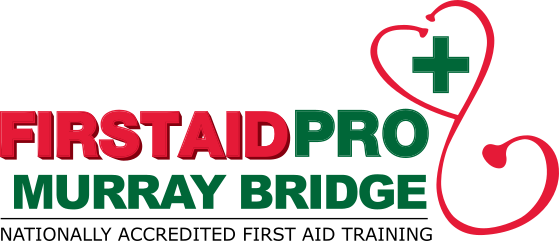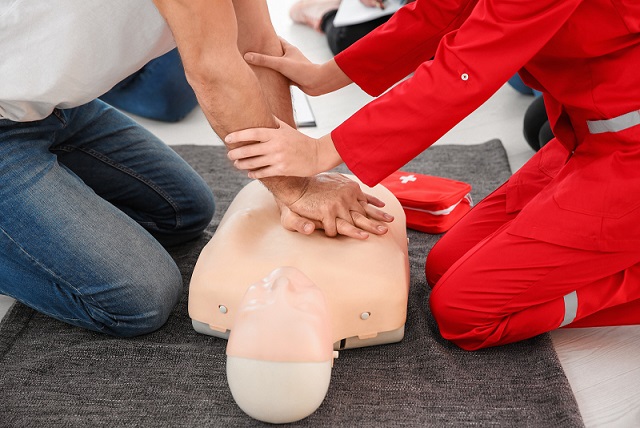Course Name
Provide cardiopulmonary resuscitation
Course Code
HLTAID009
Course Cost
$45 (may vary)
Course Duration
2 Hours
Is the course accredited?
Yes
Does the course meet workplace requirements?
Yes
Previously Known as
Available Discounts
Group Booking Discounts Available
HLTAID009 Provide cardiopulmonary resuscitation
HLTAID009 Provide cardiopulmonary resuscitation is the new benchmark for basic accredited CPR training in Australia.
It replaces the now superseded HLTAID001 Provide cardiopulmonary resuscitation.
This condensed life-saving skills unit includes all the critical elements needed to provide CPR, including:
- DRSABCD protocol
- Safe and effective defibrillation (AED) use in line with key recommendations from the following Australian Resuscitation Council (ARC) Guidelines:
- ANZCOR Guideline 3 – Recognition and First Aid Management of the Unconscious Person
- ANZCOR Guideline 4 – Airway
- ANZCOR Guideline 5 – Breathing
- ANZCOR Guideline 6 – Compressions
- ANZCOR Guideline 7 – Automated External Defibrillation in Basic Life Support
- ANZCOR Guideline 8 – Cardiopulmonary Resuscitation
Face-to-Face, 2 hours in class
Knowledge + Practical Assessment in class – no online or out-of-class workbooks or assessments.
First Aid Murray Bridge is unparalleled in its ability to deliver HLTAID009 Provide cardiopulmonary resuscitation. The totality of the course takes place in person, with no out-of-hours work or online assessments.
Both critical strands of the course (knowledge and practical) are covered in a single 2-hour class led by a fully qualified and accredited CPR trainer.
Avoid the hassle of submitting assessments online or logging into virtual chat rooms and enjoy the personal touch of a traditional face-to-face first aid course.
The saving skills unit includes all the key elements needed to provide CPR (including DRSABCD protocol and safe and effective defibrillation (AED) use) in line with key recommendations from the following Australian Resuscitation Council (ARC) Guidelines.
Course Times
Our CPR courses run in Murray Bridge every day from 9 am to 11 am or 3 pm to 5 pm and some evenings. Course times may vary. Check the course calendar HERE.
Course Cost
- This course is $45, but be sure to check our Daily Deals as you may be able to catch it for less!
- We also offer a Price Match Guarantee on comparable courses (Terms & Conditions apply)
Same-Day Certification
No Hidden Costs | Fully Accredited | Same Day Certificates (Terms & Conditions)
Upon successfully completing the training course, you will receive your certificate through your secure student portal.
With First Aid Murray Bridge, the certification process is fast, simple, and easy. You’ll have access anytime, anywhere to your first aid certificate; plus, you can print, share and download wherever and whenever you like.
Statement of Attainment
Your statement of attainment will include the following nationally recognised and accredited unit of competency
- HLTAID009 Provide cardiopulmonary resuscitation
In line with Australian Resuscitation Council recommendations, you should renew your HLTAID009 certificate every 12 months to remain current.
CPR Course Materials
Standard with every First Aid Courses Murray Bridge course enrolment is complete access to a cache of all the latest materials, resources and equipment needed to complete this unit of competency.
Students who enrol with First Aid Courses Murray Bridge get exclusive access to:
- CPR and AED Learner Guide
- CPR and AED training videos
- CPR and AED multimedia presentation
- First Aid equipment includes:
- CPR manikins
- AED training devices
- Personal protective equipment (PPE)
Knowledge Requirements
Guidelines and procedures include:
- relevant ARC guidelines to managing the unconscious breathing and non-breathing casualty and provision of CPR
- potential incident hazards and risk minimisation processes when providing first aid
- infection control procedures, including use of standard precautions and resuscitation barrier devices
- requirements for the currency of skill and knowledge
- first aid codes of practice
- appropriate workplace or site procedures relevant to the provision of first aid
Legal, workplace and community considerations, including:
- duty of care requirements
- own skills and limitations
- consent and how it relates to the conscious and unconscious casualty
- privacy and confidentiality requirements
- awareness of the potential need for stress management techniques and available support for rescuers
- considerations when providing CPR, including:
- upper airway and effect of positional change
- appropriate duration and cessation of CPR
- proper use of an AED
- safety and maintenance procedures for an AED
- chain of survival
- how to access emergency services
Techniques for providing CPR to adults, children and infants include:
- how to recognise that a casualty is unconscious and not breathing normally
- rate, ratio and depth of compressions and ventilations
- correct hand positioning for compressions
- basic anatomy, physiology and the differences between adults, children and infants relating to CPR.
Practical Skills
There must be evidence that the student has completed the following tasks in line with state/territory regulations, first aid codes of practice, first aid guidelines determined by the Australian Resuscitation Council (ARC) and other Australian national peak clinical bodies and workplace or site procedures:
- Managed, in line with ARC guidelines, the unconscious, non-breathing adult, including:
- performing at least 2 minutes of uninterrupted single rescuer cardiopulmonary resuscitation (CPR) (5 cycles of both compressions and ventilations) on an adult resuscitation manikin placed on the floor
- following the prompts of an automated external defibrillator (AED) to deliver at least one shock
- demonstrating a rotation of single-rescuer operators with minimal interruptions to compressions
- responding appropriately in the event of regurgitation or vomiting
- handing over to emergency services
- providing an accurate verbal report of the incident
- reviewing the incident
- Managed, in line with ARC guidelines, the unconscious, non-breathing infant, including:
- Perform at least 2 minutes of uninterrupted single rescuer CPR (5 cycles, of both compressions and ventilations) on an infant resuscitation manikin placed on a firm surface.
USI Requirements
A unique student identifier (USI) number is a mandatory requirement for any student wishing to undertake vocational training. A USI number is unique to you and provided by the government to keep a secure online record of your VET certifications. You can look up your number or register for a USI number quickly and easily HERE.
Covid-19 Precautions
At First Aid Murray Bridge, your health and safety are our priority. Infection control measures and Covid-19 practices are applied across all our training facilities, including but not limited to:
- Personal protective equipment (PPE)
- Social distancing, where possible
- Cleaning and sterilisation of equipment and materials
- Learner sign-in sheets
To help us keep you and your fellow learners safe, please do not attend a session if you are unwell, experiencing any symptoms or should be quarantining or self-isolating.
If a course needs rescheduling, First Aid Murray Bridge will notify learners at the earliest convenience.
Your Certificate
Get your fully accredited first aid certificate on the same day.
After successfully completing your First Aid Courses Murray Bridge training, you will receive a fully Accredited Recognised Statement of Attainment for your first aid course.
Eight New First Aid Units of Competency Released
- HLTAID009 Provide cardiopulmonary resuscitation – sometimes referred to as CPR (supersedes HLTAID001 Provide cardiopulmonary resuscitation)
- HLTAID010 Provide basic emergency life support – sometimes referred to as BELS (supersedes HLTAID002 Provide basic emergency life support)
- HLTAID011 Provide First Aid – sometimes referred to as First Aid (supersedes HLTAID003 Provide first aid)
- HLTAID012 Provide First Aid in an education and care setting – sometimes called Childcare first aid (supersedes HLTAID004 Provide an emergency first aid response in an education and care setting)
- HLTAID013 Provide First Aid in a remote or isolated site(supersedes HLTAID005 Remote first aid)
- HLTAID014 Provide Advanced First Aid(supersedes HLTAID006)
- HLTAID015 Provide advanced resuscitation and oxygen therapy(supersedes HLTAID007)
- HLTAID016* Manage first aid services and resources(supersedes HLTAID008)


